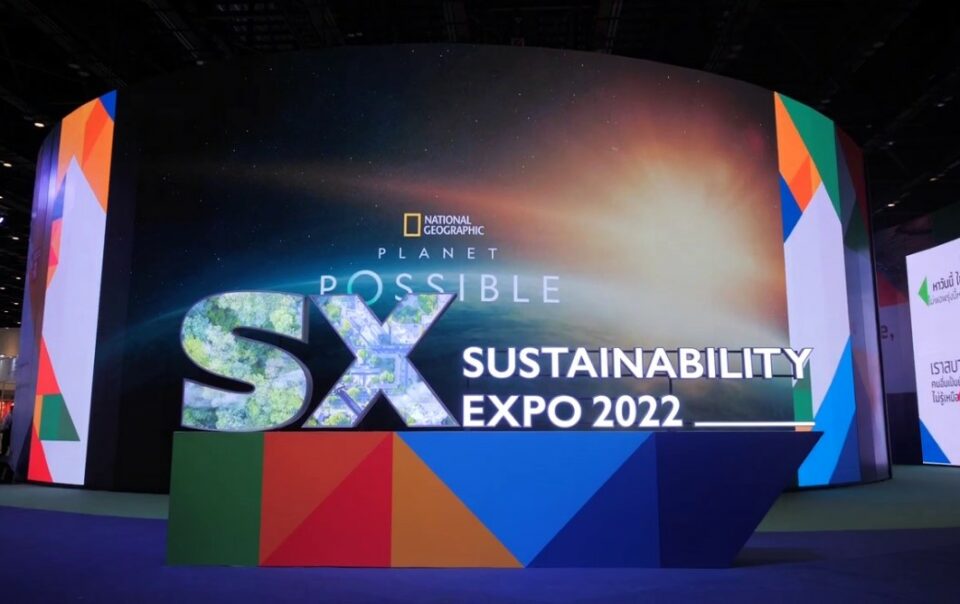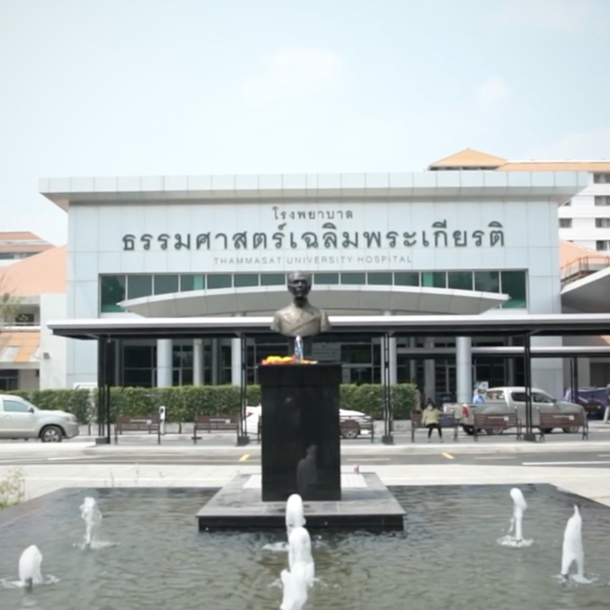
Climate Change ภาวะโลกรวน คือ การเปลี่ยนแปลงลักษณะอากาศเฉลี่ยในพื้นที่หนึ่ง (Average Weather) ซึ่งเป็นผลมาจากมนุษย์ ไม่ทางตรงก็ทางอ้อม ผลลัพธ์ของ Climate Change นำไปสู่ปัญหาใหญ่มากมาย อาทิเช่น ปัญหาภัยธรรมชาติ อุณหภูมิสูงหรือต่ำผิดปกติ ฝนตกหนัก ฝนแล้ง ลมพายุรุนแรง เป็นต้น
จากรายการ We shift World change เราปรับโลกเปลี่ยน ตอนพิเศษ SDGs talk ในตอนนี้จะเป็นการพูดถึง Sustainable Development Goals (SDGs) ข้อที่ 13 Climate Action การรับมือการเปลี่ยนแปลงสภาพภูมิอากาศ ซึ่งก็คือการสร้างภูมิคุ้มกันให้กับคนในประเทศให้พร้อมต่อความแปรปรวนทางสภาพภูมิอากาศ และยังรวมถึงการช่วยป้องกันการเพิ่มอุณหภูมิของโลกไม่ให้เกิน 2 องศาเซลเซียสอีกด้วย
ในหัวข้อนี้ได้รับฟังมุมมองจากแขกรับเชิญ 3 ท่าน ได้แก่
- ดร.พงษ์วิภา หล่อสมบูรณ์ รองผู้อำนวยการองค์การบริหารจัดการก๊าซเรือนกระจก (องค์การมหาชน)
- คุณแดน ปฐมวาณิชย์ ประธานเจ้าหน้าที่บริหาร บริษัท เอ็มอาร์ อินสแตนท์ โปรดิวซ์ จำกัด (มหาชน) หรือว่า NRF
- คุณเชอรี่ เข็มอัปสร สิริสุขะ Co-Founder little big green นักแสดงและนักเคลื่อนไหวด้านสังคมและสิ่งแวดล้อม
ซึ่งแขกรับเชิญทั้งสามท่าน จะมาช่วยให้เราให้เข้าใจ และได้เห็นมุมมองและการขับเคลื่อนทั้งของภาครัฐ ภาคเอกชน และประชาชนเกี่ยวกับ SDGs ข้อที่ 13 นี้
Climate Action คืออะไร?
ในตอนนี้ทุกประเทศในโลกล้วนได้รับผลกระทบจาก Climate Action หรือความแปรปรวนทางสภาพอากาศกันอย่างหนักเสียจนไม่สามารถประเมินเป็นตัวเงินได้ ซึ่งสาเหตุก็มาจากเรื่องใกล้ตัวที่จะต้องเคยผ่านมากันมาบ้างอย่าง “ภาวะโลกร้อน” “ก๊าซเรือนกระจก” และ “คาร์บอน” แม้จะรู้ว่าสิ่งเหล่านี้คือปัญหาแต่โลกเรายังคงมีการปล่อยก๊าซเรือนกระจกเพิ่มขึ้นอย่างต่อเนื่อง ไม่ว่าจะเป็นควันจากท่อไอเสียรถ การใช้พลังงานอย่างสิ้นเปลือง การเผาไหม้เชื้อเพลิง หรือโรงงานอุตสาหกรรมต่างๆ เป็นต้น
“สึนามิ พายุ แผ่นดินไหว น้ำแข็งขั้วโลกละลาย พวกนี้แค่ตัวอย่างเท่านั้น”
Climate Action ส่งผลกับสถานการณ์ปัจจุบันอย่างไร?
ถ้าได้ออกมาข้างนอกจะต้องรู้ได้แน่ๆว่าหน้าร้อนปีนี้กับสองสามปีที่แล้วต่างกันไปไกลมากเลย ดร.พงษ์วิภา เล่าว่าในตอนนี้โลกของเรามีอุณหภูมิบวกลบ 8 องศาเซลเซียสเนื่องจากการเผาขยะ การปฏิวัติโรงงานอุตสาหกรรม และข้อมูลที่น่าตกใจมากๆ คือให้ลองคิดภาพมีก้อนดำๆ ลอยอยู่เหนือโลกของเราในตอนนี้กว่า 49,000 ล้านลูก โดยที่ประเทศไทยเองเป็นคนปล่อยก้อนพวกนั้นกว่า 350 ล้านลูก ซึ่งก้อนดำๆ เหล่านั้นก็คือก๊าซเรือนกระจกนั่นเอง
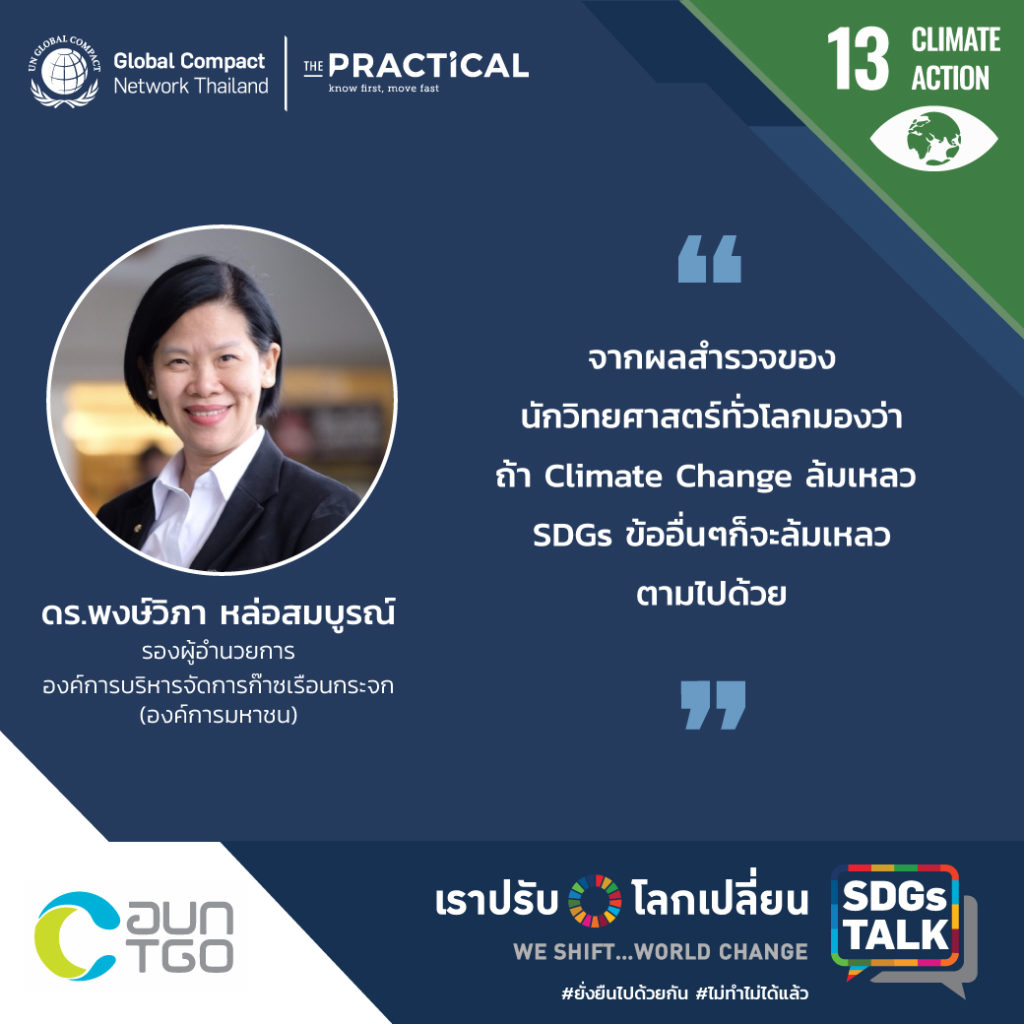
คุณแดน ทำธุรกิจเกี่ยวกับอุตสาหกรรมอาหารเผยว่า ถึงแม้เราจะไม่ได้เป็นเจ้าของธุรกิจ มีโรงงานอุตสาหกรรมปล่อยควันดำๆ แต่อาหารที่เรากินเข้าไปทุกวันนั้นมีส่วนในการปล่อยคาร์บอนกว่า 40% ของคาร์บอนทั้งหมดเลย เพราะฉะนั้นคงพูดไม่ได้ว่าเราไม่เกี่ยวกับการปล่อยคาร์บอนเหล่านี้
“จากแม่น้ำกลายเป็นดินแห้งผาก ในชีวิตไม่เคยเห็นอะไรแบบนี้มาก่อนเลยเหมือนกระดิ่งดัง ว่าต้องทำอะไรสักอย่างแล้ว”
ในมุมมองของประชาชนทั่วไปหากไม่ได้ศึกษาให้ดี ก็คงไม่ได้ทราบถึงความเดือดร้อนที่เกิดขึ้นแน่ คุณเชอรี่เองก็เริ่มสนใจเรื่องพวกนี้เพราะออกเดินทางแล้วได้เห็นธรรมชาติ สิ่งแวดล้อมที่เปลี่ยนไป แล้วเมื่อเราสนใจ ยิ่งหาข้อมูล ยิ่งเสพข้อมูล ยิ่งพบกับความจริงมากขึ้นว่ามันไม่ได้ไกลตัวเลย มันอาจจะอยู่แค่ที่นาหรือสวนหน้าบ้านคุณที่แห้งแล้งกว่าปีที่ผ่านมาเพราะฝนไม่ตก และน้ำในคลองก็แห้งเกินกว่าจะสูบมาทำไร่ทำนา
ณ ตอนนี้ ประเทศไทยอยู่อันดับ 8 ของโลก ที่มีความเสี่ยงสูงสุดในเรื่องผลกระทบจาก Climate Action
ประเทศของเรามีชายฝั่งติดกับทะเลเยอะ จึงมีความเสี่ยงเยอะที่น้ำจะหนุนขึ้นสูงจากความแปรปรวนทางสภาพภูมิอากาศ และนี่เป็นสิ่งแรกๆที่นักลงทุนจะเลือกมองเวลาหาที่ลงทุน ทำให้ไทยอาจจะเสียโอกาสในการดึงนักลงทุนเข้ามาลงทุนภายในประเทศไปได้
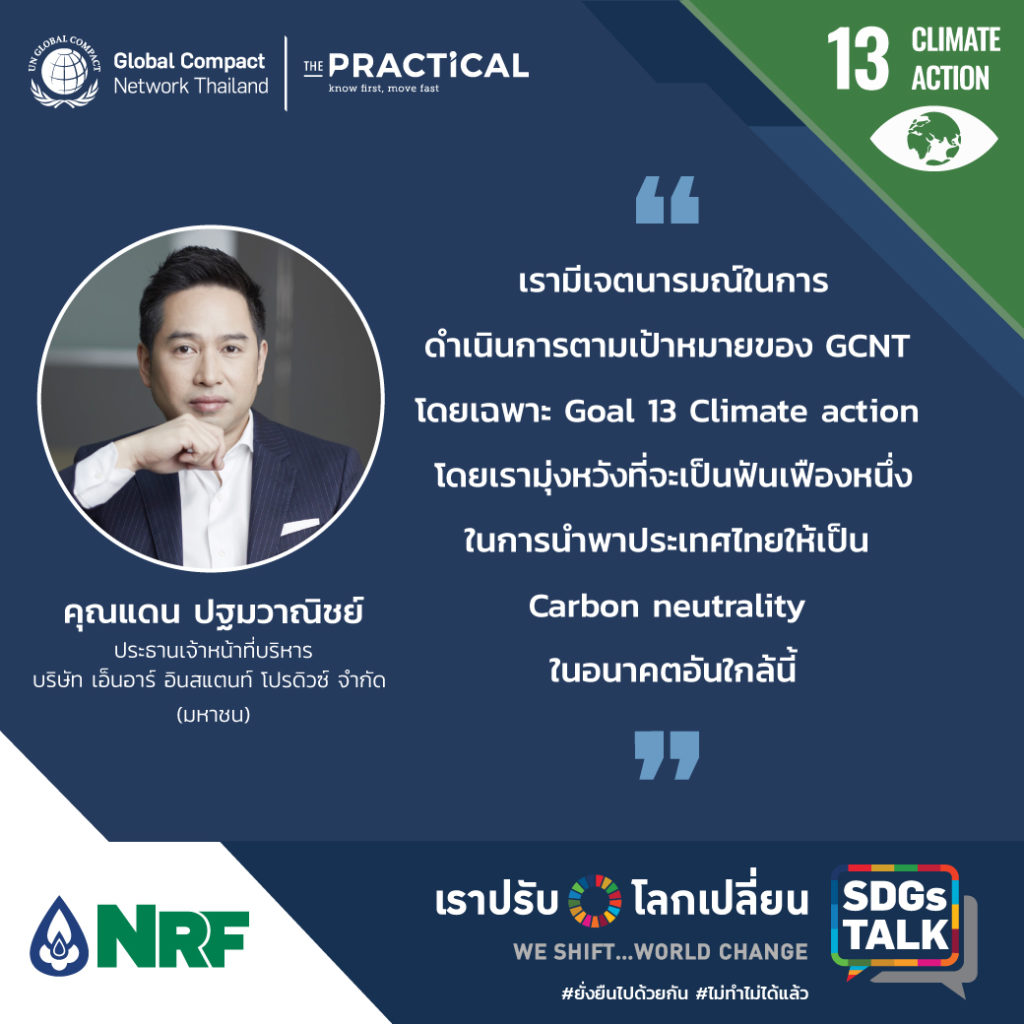
ซึ่งในมุมมองของคุณแดน ที่เป็นภาคเอกชนเองมองว่าโรงงานอุตสาหกรรมทั่วไปยังไม่เห็นภาพ และยังไม่ตระหนักถึงผลกระทบที่เกิดขึ้นจากการดำเนินธุรกิจ หากอุตสาหกรรมอาหารยังคงไปในทิศทางเดิม อีก 100 ปีข้างหน้า โลกเราจะมีอุณหภูมิเพิ่มขึ้นอีก 3 องศาเซลเซียส ส่งผลให้น้ำจะแล้ง ระบบอาหารการกินของคนบนโลกจะพัง และคนจะอดตายจากการขาดแคลนอาหารในที่สุด
“ยิ่งเห็น ยิ่งเข้าใจ ก็จะทำให้จาก Personal mission เป็น Company mission”
นี่จึงเป็นเหตุผลให้โรงงานของคุณแดนมีความตระหนักและพยายามที่จะช่วยในเรื่องของการปล่อยคาร์บอนมากๆ และทำให้บริษัทของคุณแดนได้เข้าร่วมโครงการ Business ambition for 1.5˚C ซึ่งเป็นโครงการที่มีเป้าหมายการบรรลุปริมาณการปล่อยก๊าซเรือนกระจกเป็นศูนย์ (Zero net emission) และเป็นบริษัทเดียวที่เป็น carbon neutral หมายความว่าไม่มีการปล่อยก๊าซเรือนกระจกสู่ชั้นบรรยากาศเพิ่มขึ้นจากการดำเนินธุรกิจ
การแก้ไขปัญหาในตอนนี้จนถึงอนาคต
ในส่วนของภาครัฐ ดร.พงษ์วิภา เผยว่าประเทศไทยของเราเป็นหนึ่งในประเทศที่ได้ให้คำมั่นสัญญาว่าจะลดปริมาณการปล่อยก๊าซเรือนกระจก โดยตั้งเป้าไว้ที่ลดลงให้ได้ 20% หรือ 21 ล้านตันภายในปี 2030 และยังมีแผนยุทธศาสตร์ชาติ 20 ปี ซึ่งเป็นแผนการลดการใช้พลังงานฟอสซิลเช่น น้ำมัน ถ่านหิน เป็นต้น โดยการหันมาใช้พลังงานหมุนเวียน และปลูกต้นไม้ รักษาต้นไม้เพื่อดูดซับก๊าซเรือนกระจกเข้าไป
“เพราะว่าให้เลิกปล่อยก๊าซเรือนกระจกคงทำไม่ได้ จึงต้องลดด้วยเทคโนโลยีและต้นไม้”
ซึ่งแนวความคิดนี้จะตรงกับการดำเนินงานของโรงงานคุณแดนพอดี เพราะโรงงานของคุณแดนที่ทำเกี่ยวกับอุตสาหกรรมอาหาร ไม่ได้บอกให้ทุกคนเลิกกินอาหารเพื่อช่วยลดการปล่อยก๊าซเรือนกระจก แต่บอกให้ทุกคนกินอาหารให้ดี
โรงงานของคุณแดนเองทำหน้าที่ในการผลิตอาหารทางเลือก ยกตัวอย่างเช่นโปรตีนทางเลือก ซึ่งหลายคนอาจจะเข้าใจว่าก็คงเหมือนอาหารเจ ที่นำเอาเต้าหู้ แป้งมาแปรรูปให้คล้ายกับเนื้อสัตว์แต่คุณแดน ได้เล่าให้ฟังว่าจริงๆแล้ว โปรตีนทางเลือกมีทั้งที่มาจากพืช, การเพาะเซลล์สัตว์ และจากแมลง ซึ่งตอนนี้รสชาติใกล้เคียงกับเนื้อสัตว์จริงๆแล้วถึง 90%
“เบอร์เกอร์โปรตีนทางเลือกปล่อยคาร์บอนน้อยกว่าเบอร์เกอร์เนื้อสัตว์จริงๆถึง 1:10”
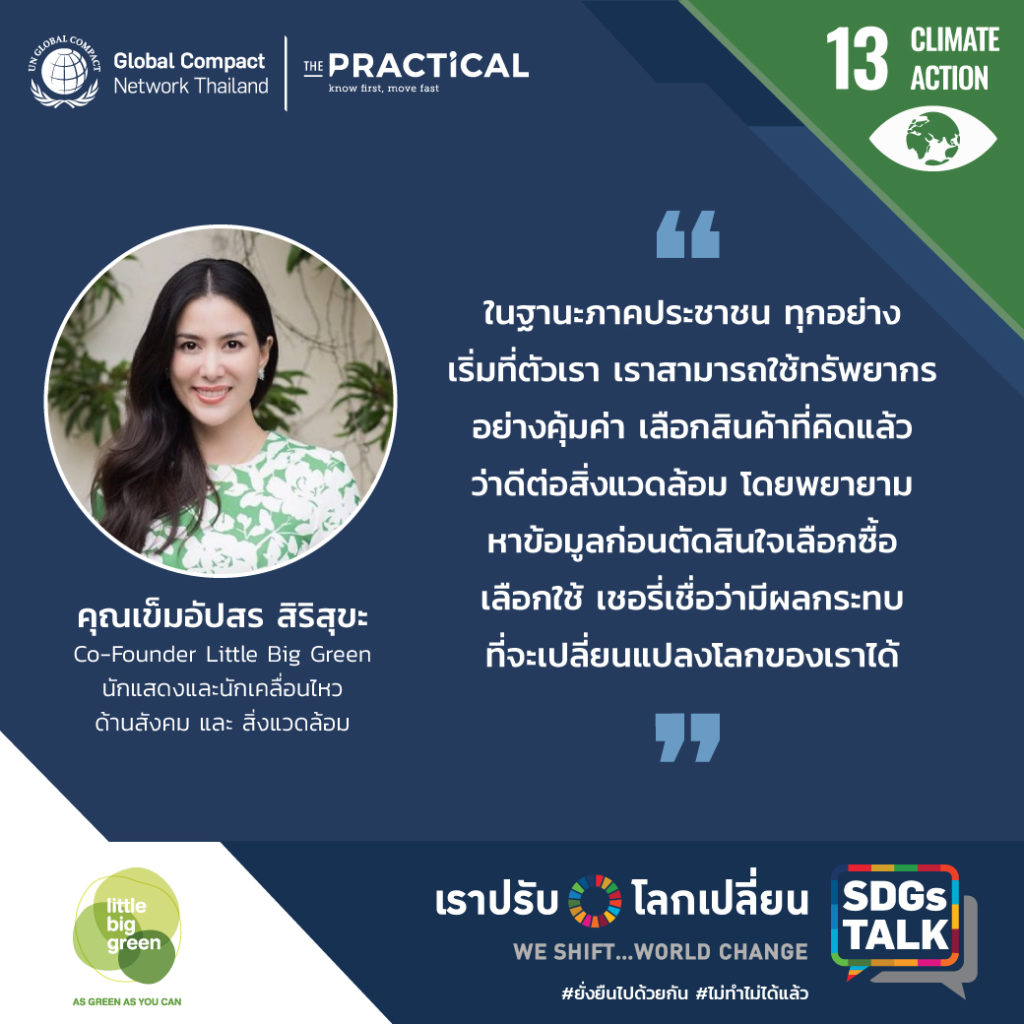
นอกจากนี้ในด้านของประชาชนเอง ก็ไม่ใช่เพียงนิ่งเฉยเพื่อรอการจัดการจากภาครัฐและเอกชนเพียงเท่านั้น เพราะคุณเชอรี่ เองที่ได้ผันตัวเป็นนักขับเคลื่อนในเรื่องนี้ได้เล็งเห็นถึงปัญหา และพยายามมองให้เห็นถึงทางแก้ว่าประชาชนสามารถทำอะไรได้บ้าง คุณเชอรี่ มีโครงการ Little Forest ปลูกต้นไม้เพื่อเสริมและรับผิดชอบดูแลให้เป็นเวลา 3 ปี มีการดึงคนที่อาศัยอยู่โดยรอบเข้ามาร่วมโครงการนี้ด้วย สร้างความผูกพันระหว่างคนในพื้นที่กับป่า จะได้ช่วยเป็นหูเป็นตาดูแลด้วยกัน และไม่ใช่แค่ดูแลป่าอย่างเดียวเท่านั้น คนในพื้นที่ก็ได้รับการดูแลและได้ผลประโยชน์จากป่าโดยที่ไม่ใช่การรุกล้ำ หรือหาประโยชน์จากพื้นที่ป่าเพียงอย่างเดียวอีกด้วย
“ไม่ใช่ว่าป่าอยู่ได้ แต่คนอดตาย ต้องหาตรงกลางให้เจอ”
ดร.พงษ์วิภา ยังเสริมอีกว่า การช่วยลดก๊าซเรือนกระจกอย่างเช่นการติดตั้งโซลาร์เซลล์อย่างโรงงานของคุณแดน หรือการช่วยปลูกป่าอย่างคุณเชอรี่ ก็สามารถแลกเป็น “คาร์บอนเครดิต” ได้ มีการซื้อขายหรือมีตลาดคาร์บอนเครดิตช่วยทำให้ต้นทุนในการลดการปล่อยก๊าชเรือนกระจกของอุตสาหกรรมลดลง และนำคาร์บอนเครดิตที่เกิดขึ้นไปขายให้กับโรงงานที่มีต้นทุนสูง ทำให้ปริมาณก๊าชเรือนกระจกในภาพรวมลดลงตามเป้าหมายที่ตั้งไว้ ในต้นทุนเฉลี่ยที่ต่ำลง นอกจากนี้ยังสามารถหลักฐานการซื้อขายไปลดหย่อยภาษีได้อีกด้วย
การสื่อสารเป็นเรื่องที่ใครก็ทำได้
ไม่ว่าคุณจะอยู่ในบทบาทไหน ทุกคนสามารถมีส่วนร่วมในการช่วยลดก๊าซเรือนกระจกได้ทั้งหมด เพียงแค่เริ่มที่ตัวคุณแล้วทำให้เกิดการบอกต่อ คุณเชอรี่ ตัดสินใจถ่าย Vlog แล้วโปรโมทลงยูทูปเกี่ยวกับไลฟ์สไตล์ที่ช่วยลดการปล่อยก๊าซเรือนกระจก การกิน การอยู่ การไปเที่ยว การเลือกซื้อของ เมื่อเริ่มแล้วบอกต่อจึงเกิดเป็นการทำตาม เกิดเป็นกระแส ส่งผลถึงภาคเอกชนที่ผันแปรตามผู้บริโภค หากทำให้การสนับสนุนโรงงานที่มีความตระหนักเกี่ยวกับก๊าซเรือนกระจกเป็นกระแสขึ้นมา โรงงานส่วนใหญ่ก็จะเริ่มปรับตามเพื่อให้เป็นที่นิยม โดยที่ภาครัฐมีนโยบายในการสนับสนุนการกระทำเหล่านี้ เท่านี้ก็จะเกิดการเปลี่ยนแปลงแล้ว
บทสรุป
จากมุมมองทั้งสามมุมมองจะเห็นได้เลยว่าไม่ว่าคุณจะเป็นใคร ภาวะโลกร้อนตอนนี้มันร้อนถึงตัวคุณแล้วจริงๆ ผลกระทบจาก Climate Action มีให้เห็นทั้งในอดีตที่ผ่านมา ปัจจุบันที่กำลังจะเกิด และพยากรณ์ถึงอนาคตที่รอเกิดขึ้นอยู่อีกมากมาย มันถึงเวลาแล้วที่เราทุกคนควรร่วมด้วยช่วยกันคนละนิดคนละหน่อยเพื่อลดก๊าซเรือนกระจกในชั้นบรรยากาศ ซึ่งมันอาจจะเริ่มขึ้นได้ตั้งแต่คุณตื่น คุณหยิบอะไร ทำอะไร กินอะไรเข้าไป สิ่งเหล่านี้สามารถช่วยได้ทั้งหมด ปรับทีละนิดจนมันกลายเป็นไลฟ์สไตล์ของคุณเอง อย่าให้มันเป็นเพียง การตระหนัก แต่ไม่ตระหนก ปัญหาสิ่งแวดล้อมไม่ใช่แค่ปัญหาของภาครัฐ เอกชน หรือประชาชนคนใดคนหนึ่ง แต่มันเป็นปัญหาของทุกคนดังนั้น “ทุกอย่างเริ่มได้ที่ตัวคุณเอง”
….
รายการ “เราปรับ…โลกเปลี่ยน We Shift…World Change”
ตอน “ถามตรง ภาวะโลกรวน Climate Change”
หรือ จะเลือกรับฟังรายการ ในรูปแบบของ Podcast ได้ที่:
ติดตามชมรายการ “เราปรับ…โลกเปลี่ยน We Shift…World Change” Facebook
ได้ทาง Facebook เพจ @มนุษย์เงินเดือนพันธุ์ใหม่ หรือ Facebook Global Compact Network Thailand และ ช่องทาง Social Media ของ The Practical


